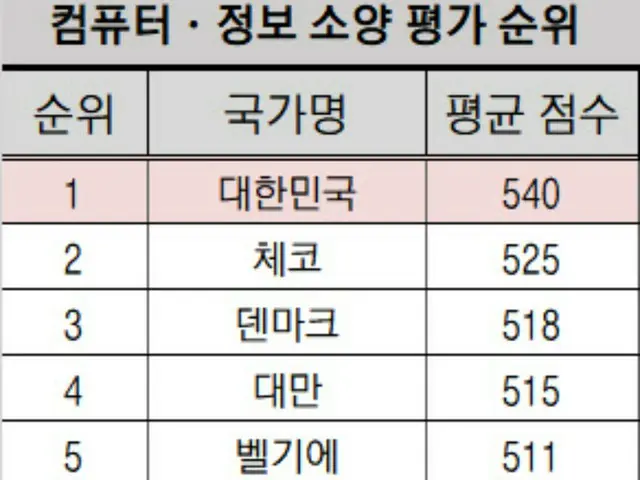The Ministry of Education (equivalent to the Ministry of Education, Culture, Sports, Science and Technology) has announced the establishment of the International Computer and Information Literacy
The International College of International Students (ICILS) survey was conducted by the International Association for the Evaluation of Educational Achievement (IEA) in the United States and included 132,990 responses from 5,299 schools in 34 countries around the world.
A total of 8 students participated. 3,723 second-year students from 152 junior high schools in South Korea were assessed. ICILS began in 2013 and is conducted every five years.
The data and information literacy assessment assesses the ability to use computers to research, generate information, and communicate. Computational thinking is also assessed by using computers to solve problems.
The test measures students' ability to recognize solvable problems and present solutions to them. Korean students received an average score of 540 points in the computer and information literacy assessment, taking the top spot.
525 points) △Denmark (518 points) △Taiwan (515 points) △Belgium (511 points) △Portugal (510 points) △Latvia (509 points) △Finland (507 points) △Austria (
Korea came in second with 506 points, followed by Hungary with 505 points. The average score for the 34 countries in the computer and information literacy assessment was 476 points. Korea was 64 points higher than the average.
Korea also had the highest percentage of students who received the highest level of "Level 4" in the computer and information literacy assessment, at 6 percent, out of the 34 countries. The Czech Republic, Denmark, and Belgium each had the same percentage.
The percentage of students in the next level, "Level 3," was relatively high in Korea at 31%, compared to 23% in the Czech Republic, 22% in Denmark, and 23% in Taiwan.
Meanwhile, when it comes to the lowest grade of "below level 2," South Korea had the second lowest weighting at 8%, after the Czech Republic (6%).
In the computing thinking test, South Korea came in second with a score of 537, behind Taiwan (548 points).
Next are the Czech Republic (527 points), Belgium (509 points), Denmark (504 points), Finland (502 points), France (499 points), Slovakia (498 points), and Latvia (495 points).
This was followed by China (485 points) and Sweden (486 points). The international average was 483 points, which Korea scored 54 points higher. The Ministry of Education stated, "Korean students have improved their computer and information literacy and
"Compared to the 2018 results, the international average for 2023 dropped significantly, while Korea's average score remained the same, and Korea's average score for 2023 was ranked 1st in the world," he said.
"We found that Korean students have excellent computer literacy and digital literacy," said Yeong Jun, director of the Ministry of Education's Office for Responsible Education Policy.
"Since computing ability is a core skill that students need to have in the digital age, we need to provide more opportunities to develop it in public education," he said.
With the 2022 revised curriculum emphasizing digital literacy and the introduction of AI-based digital textbooks tailored to each student, we are proactively supporting students to develop as digital citizens.
"We will provide support to these efforts," he said.
2024/11/12 21:39 KST
Copyrights(C) Edaily wowkorea.jp 78

